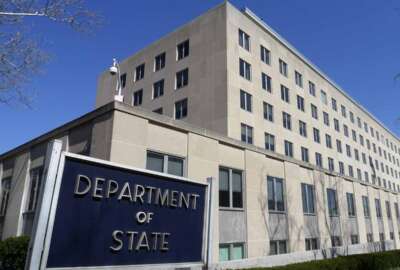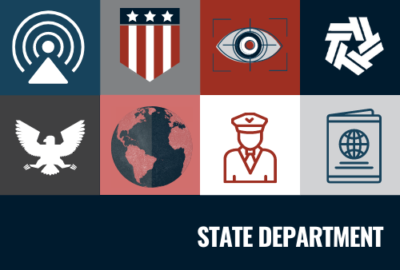

The State Department will add a new internship program to its roster. The Colin Powell leadership program will open to college students and recent graduates and...
Best listening experience is on Chrome, Firefox or Safari. Subscribe to Federal Drive’s daily audio interviews on Apple Podcasts or PodcastOne.
As part of its drive to modernize and diversify its workforce, the State Department will add a new internship program to its roster. The Colin Powell leadership program will open to college students and recent graduates and it’s planners hope, prepare them for long term success at the State Department. The Federal Drive with Tom Temin gets more from the deputy director of talent services. Beth Sheppard.
Interview transcript:
Tom Temin: So the State Department has several internship programs. It’s kind of a tradition there. Why is a new one needed?
Beth Sheppard: The ultimate goal of this internship program is really to develop future civil service leaders who embrace diversity and inclusion as a mindset. Throughout Colin Powell’s career and life, he built teams with a diversity of background, experiences and thought and he had a strong commitment to continuous learning. Ultimately, this helped him make stronger decisions throughout his career and helped him achieve many great achievements. This program is aimed at learning through Colin Powell’s experiences to build strong leadership skills through official training and mentoring and on the job experience. Our goal is to provide participants with the skills, tools and resources needed for long term success at the State Department. This program also supports Secretary Blinken’s modernization agenda, and winning the war for talent by continuing to build and retain diverse, dynamic workforces.
Tom Temin: It sounds then that as if the people chosen for this program will be in a sense predetermined to have potential leadership skills, and then we’ll get the types of training and mentoring that can move them up in the department over time?
Beth Sheppard: Yes, absolutely. When applicants apply to this program, we’re looking for people who have strong academic, cross cultural, and leadership potential. And then we’re going to work with them to explore Colin Powell’s career, study his leadership lessons, and to figure out how we can actually use this going forward in their career.
Tom Temin: Yeah, I met Colin Powell a couple of times, and quite a dynamic individual, even one-on-one. Definitely a good person to name a program after. So you’re looking for what then what will be in the application process such that you can assess people that will say, hey, this person can move up one of these days and maybe not 10 years or 20 years, but pretty soon?
Beth Sheppard: Absolutely. As part of the application requirements, we’re going to ask that applicants submit their transcripts, their resume, and a statement of interest really outlining their leadership potential and experience because obviously students and recent graduates, they have ample opportunities to exercise and have those leadership skills. And they’ll be taking part in interviews, panel interviews with the hiring managers and the bureaus, to really assess that leadership potential.
Tom Temin: Are there any particular academic courses and coursework that will come into play? In other words, could someone be studying and majoring in trigonometry, as well as in foreign affairs, and still have that potential?
Beth Sheppard: Management analysis fields do not have the positive education requirements. Foreign affairs, that field does have some positive education requirements, but it’s generally met through some basic classes and coursework, and you can find the courses that are required on OPM’s website.
Tom Temin: And on the diversity front, you know, the State Department has lived with the knock for many years that even though it has diversified in terms of racial makeup and ethnic background, the people coming in that hasn’t filtered up to the highest ranks. Is this, what you’re trying to at least make a stab at with this program?
Beth Sheppard: Sure. You know, I always tell the global talent management front office that diversity is a marathon, it’s not a sprint. So it takes a number of different efforts to get a workforce that is truly representative of all segments of society. I guess this is one of those efforts that is going to that goal of trying to diverse all levels of the State Department reaching all segments of society.
Tom Temin: We’re speaking with Beth Sheppard, she’s deputy director of talent services at the State Department. And therefore you have the challenge of bringing in people that are diverse, but yet not exercising some kind of reverse discrimination practice in getting in people. So how will you go about selecting the candidates with that idea in mind?
Beth Sheppard: Of course, with the merit system principles, we cannot make hiring decisions based on protected characteristics. What we’re doing is really expanding the recruitment and outreach for this program. We have a great team of diplomats and residents throughout schools throughout the entire United States. We have a very robust talent network. We have employee organizations that we’re really leaning into to get the word out about this program. Again, we really want the State Department to be seen as accessible, and available to anybody and everybody.
Tom Temin: And of course, there are the HBCUs, the historically black colleges and universities and the Hispanic institutions and so forth. So I imagine that’ll be kind of targeted for making sure they are aware?
Beth Sheppard: Yes, correct. We are using our social media and the diplomats and residents to get the message to their schools.
Tom Temin: And once the interns come in, then what specific channels of work in the State Department will they be assigned to?
Beth Sheppard: They’ll be working in Washington, DC throughout the domestic bureaus, and they’ll be working in support of the management analysis and foreign affairs fields. We want them to be in Washington, DC to take full advantage of the professional development events that we’ll be having and the networking events, that we’re excited to have a very robust program with lots of training and professional development events.
Tom Temin: Foreign affairs, I get, because it’s the State Department. Management analysis, what is that all about?
Beth Sheppard: Management analysts are all throughout the State Department. And their roles and responsibilities are really varied. They’re located in every single bureau. And you can be really working on a number of different projects. Really, you’re looking at how to better support management and making better decisions. And what better program to do this with, with a program that’s looking at developing skills that embrace diversity as a mindset.
Tom Temin:
And just out of curiosity, because it’s a personal interest, the State Department has a large portfolio of in many cases, historically,or artistically significant buildings around the world. Construction is a big part of State Department, will some of the interns maybe be assigned in that area? That seems like it’s sort of management analysis in a way?Beth Sheppard: Well, we do have a variety of construction engineers that help with the buildings overseas. And I do agree with you, Tom, we have some gorgeous buildings, domestically and overseas. We are not hiring for construction engineers at this time. But certainly the management analysts could be supporting some of those projects, whether it be you know, managing the budgets or looking at the data that supports some of those projects and doing some project management work.
Tom Temin: And in the area of foreign affairs, of course, there’s direct diplomacy, and you know, it takes some real doing to be able to reach the rank of diplomat, but diplomats are supported by people that know culture, that know language, that kind of support the projection of American prestige, if you will. And part of that prestige is other countries understanding that we understand them. Is that an area for Foreign Affairs?
Beth Sheppard: Absolutely. We have many different regional bureaus, and many people who specialize in certain countries, regions and cultures. And so we are looking for people who have that type of experience who can offer expertise in those areas.
Tom Temin: And after the conclusion of the internships, then will the interns have to reapply? Or how do they get into State Department as a career?
Beth Sheppard:
What I love about this program is whether they’re coming in as a fellow or an intern, both programs provide a direct path to permanent civil service jobs. And that’s what’s so critical. Whenever we were developing the program, we wanted to make sure that they had a pathway to long-term employment at the State Department, and this program achieves that.Tom Temin: Fellows are postgraduate take ins and interns are still undergrads?
Beth Sheppard: Correct.
Tom Temin: And then I guess my final question is, what are the timelines here? When does this all get underway? And when do you expect to ingest these people?
Beth Sheppard: We are launching the vacancy announcement in early October, we are anticipating that it will be open for five days, five business days. And we will go through the whole qualification process of assessing the applications. And then we will refer the qualified candidates to the hiring managers in late October, early November for them to conduct structured interviews. Then the selected candidates will go through the security clearance process. Our goal is to have this first cohort on board and early summer 2023.
Tom Temin: And how many do you expect to be in that cohort?
Beth Sheppard: With the interns for this first year, we are looking at hiring 10 to 12. And for the fellows, we’re looking at hiring four to six.
Tom Temin: And you probably have 50 hiring managers after them.
Beth Sheppard: Yes, we are actually collecting the applications for the bureaus to participate in this program. So not everybody’s going to get one, but we’re certainly going to try our best to have a full representation of different functions and bureaus involved in this.
Tom Temin: Beth Sheppard is deputy director of talent services at the State Department.
Copyright © 2025 Federal News Network. All rights reserved. This website is not intended for users located within the European Economic Area.
Tom Temin is host of the Federal Drive and has been providing insight on federal technology and management issues for more than 30 years.
Follow @tteminWFED



